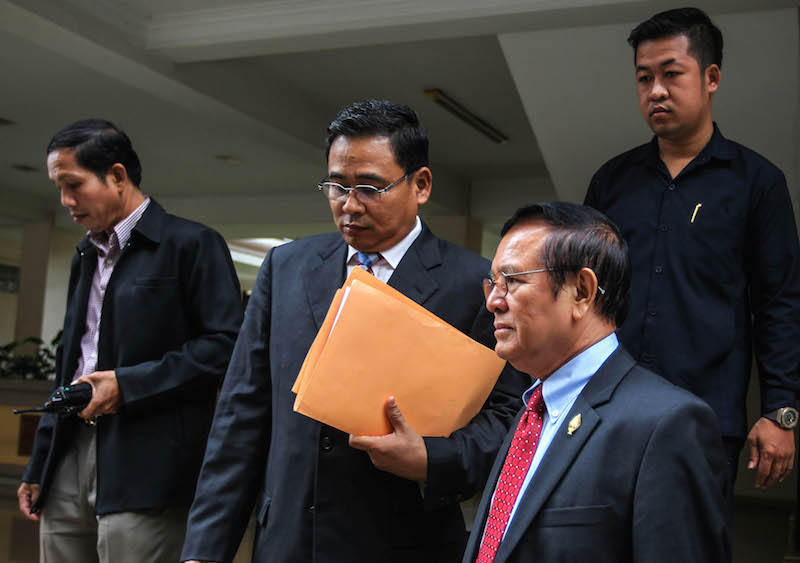While highly contentious new rules were being passed in the National Assembly on Monday banning the CNRP from collaborating with its former leader Sam Rainsy, photographs were posted to Facebook of senior opposition lawmakers dining at a riverside hotel in Kampot province.
It was just the latest example of the CNRP refusing to vote on legislation it criticized as an exceptional breach of the Constitution.

Opposition lawmakers in February dodged the first vote on amendments to the Law on Political Parties—widely panned as politically motivated—as the ruling party approved changes that handed the government and courts sweeping new powers to suspend and dissolve any party over vaguely worded offenses.
That came after CNRP lawmakers avoided the National Assembly for five months last year in protest of a court case brought against then-party vice president Kem Sokha and the government’s general disregard for the legal immunity of its lawmakers.
The opposition has claimed that attending a vote deemed unconstitutional would give the ruling party—which can push through legislation due to its majority—the rubber stamp of legitimacy. But others have urged them to air their grievances on the floor and vote against such laws.
“Every time the CPP proposes something they don’t agree with, then they just say they’re going to boycott it,” said Ou Virak, head of the Future Forum think tank.
In picking and choosing what legislation on which to vote, Mr. Virak said, the CNRP needed to be clearer about whether it was actually challenging the legitimacy of the National Assembly.
“It’s actually a split personality issue. You either accept the legitimacy of the parliament which means…you should be in parliament and you should make your vote and voice count, or you don’t accept the legitimacy of the government, then you boycott,” he said.
“The question is: What is the position of the CNRP? Do they accept the legitimacy or not?”
“The answer is: I don’t think they do,” he said. “If they accept the legitimacy of the CPP to compete…then you have to accept that the CPP party have the majority of parliament and have the right to actually see through their policies of their choosing.”
Lee Morgenbesser, a research fellow at Australia’s Griffith University and the author of “Behind the Facade: Elections Under Authoritarianism in Southeast Asia,” said the CNRP’s current strategy of shunning what it considers illegitimate legislation was bearing little fruit.
“The decision to boycott suffers from the law of diminishing returns. Doing so consistently gains the CNRP short-term publicity, but they continuously fail to leverage this publicity into anything tangible over the long-term,” Mr. Morgenbesser said in an email.
“This outcome is symptomatic of the opposition’s failure to develop a strategy that goes beyond participating in flawed autocratic institutions.”
However, simply turning up to the National Assembly to criticize and vote against legislation would, indeed, offer a rubber stamp of legitimacy, he said.
“Such participation—even if it meant voting ‘no’—lends credibility to the legislative process,” he said. “The ruling party would merely claim their participation is evidence of not only Cambodia’s ‘healthy’ party system, but ‘vibrant’ democracy.”
CNRP lawmaker Son Chhay said the opposition did not shy away from voting on issues with which it disagreed. Boycotts were reserved only for legislation it felt violated the country’s Constitution, he said.
“Normally, when the parliament has a debate on the laws which will serve the interests of the country, even if we have some concerns on some parts of the law, we will take part in the debate and we will put our concerns to the floor,” Mr. Chhay said.
“But some very, very serious cases…by taking part you’re allowing the CPP to violate the Constitution so they can abuse our members of parliament,” he said.
There are plenty of other ways for the CNRP to voice its case against the ruling party’s actions, Mr. Chhay said.
“We can raise that outside parliament. No problem with that,” he said. “Why do we have to sit there to get enough numbers to destroy us? It would make no sense to do it.”
CNRP Vice President Eng Chhay Eang said the party did not question the legitimacy of the National Assembly, but reserved the right to abstain from voting in exceptional circumstances, such as the Law on Political Parties.
“Some laws we did not support but we went to join a meeting and debate in the Assembly, but some laws we totally boycotted,” he said. “It’s so bad that we cannot keep spending time discussing it because having a discussion is useless.”
Government spokesman Phay Siphan said the opposition should engage in the National Assembly no matter how much it opposes the legislation on the table.
“That’s their culture. They do nothing,” Mr. Siphan said. “Their obligation in the National Assembly should be to voice their concerns, voice their support or not. A boycott doesn’t mean anything.”
He said the opposition had “an obligation” to the National Assembly to debate pending legislation. “The public wants to hear on that, but they did not. Instead of debating they make accusations.”
Mr. Virak also said he would like to see the CNRP use parliament to pitch alternatives to the electorate.
“That’s the sort of competition I want to see,” he said. “But that’s not what’s happening in Cambodia.”
(Additional reporting by Ouch Sony)



